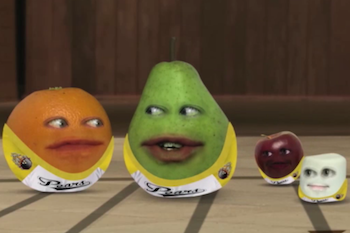YouTube Star Freddie Wong Launches a Summer Blockbuster -- Without a Studio
YouTube sensation Freddie Wong is out to prove you can release a summer blockbuster without a major studio.
His new feature-length film, "Video Game High School," has been watched more than 40 million times since its release in May.
But Wong didn't debut "VGHS" in a movie theater, nor on YouTube, where he and partner Brandon Laatsch (pictured below) operate a channel, Freddiew, that has more than 3.2 million subscribers.
The film -- chopped up into nine 10- to 20-minute pieces -- premiered on RocketJump, an ad-supported site that he and Laastch launched with "VGHS" showrunner Matthew Arnold to host content outside of YouTube.
The film is about a world where nerds and their videogames have replaced jocks and sports at the top of the social pyramid. Each new part aired for a week on RocketJump, then moved onto Wong's popular YouTube channel.
Though YouTube eventually made up the majority of its views, RocketJump has still accounted for more than 7 million views to date, with traffic increasing as more people discovered that the newer episodes were debuting on the native site.
Also Read: YouTube Stars Align With Their CAA for the Digital Set
"Even at the highest level of YouTube, the money you can get will never fund something like 'VGHS,'" Wong told TheWrap. "We need our own place to exhibit our own content and we need to be able to control that user experience, and have a way to guide viewers through content."
Wong and his partners conceived RocketJump about the same time they were making "VGHS." The goal was to extend their brand and create a better viewing experience for consumers.
Also Read: YouTube Sensation Freddie Wong: 'Hollywood Is Out of Date' (Exclusive)
While YouTube controls the display and formatting, the Freddiew team and its management company, the Collective Digital Studio, is able to tailor RocketJump to their core audience, mostly gamer fans.
"We can create a more immersive experience on a platform Freddie owns and controls," Dan Weinstein, head of the Collective's digital enterprise, told TheWrap.
That means adding behind-the-scenes footage, podcasts, written descriptions of the clips, a different commenting system -- and, potentially, transmedia experiences.
Key important, though, to the bottom line are the business implications.
Filmmakers posting videos on YouTube must split the revenue with Google's online video behemoth. That places a lower ceiling on the money that can be made from a video.
"We can potentially leverage brands and sponsors more than on YouTube because we control the entire ecosystem," Weinstein said. "[RocketJump] was about doing different types of deals that were more immersive and had more flexibility to custom create advertising programs."
To that end, RocketJump also helps on the merchandising side; the site features a store that sells T-shirts, posters and DVDs.
"It's hard to sell merchandise off YouTube," Wong told TheWrap. "When you have a home and create a brand people believe in and want to support, it makes it easier for you to control merchandise and sell it."
"In the traditional film world, box-office revenue is considered more glamorous than other sales, but if there's one thing we can learn from George Lucas -- other than don't remake your shit -- it's that toys and merchandise are all equal," Arnold told TheWrap. "At the end of the day, a dollar is a dollar."
Laatsch and Arnold said that making "VGHS" from YouTube money alone would have been impossible.
Though "VGHS" production cost about $500,000, much of the funding came from other sources. The Freddiew team launched a Kickstarter campaign, which netted them $273,276.
They also raised money for shoots through sponsors, such as evite.com and Monster, the energy drink company. In return for the organic use of Monster within the series -- gamers love their caffeine -- Wong could shoot an extended chase scene that otherwise would have been too costly.
Neither they nor the Collective, however, would offer up income figures from the project, because they say the project is still new, and the numbers are still building.
However, they claim it is profitable, and they are already at work on a sequel, which will have a larger budget than the first one. A script is in the works, with production expected to start early next year.
All this seems to bode well for Wong's overall career.
Indeed, several mainstream Hollywood producers have praised Wong's work as ready for theaters. And though Wong has previously said he was uninterested in working with film studios or television networks, that attitude seems to be changing.
He now says he would consider it -- as long as he doesn't have to give up his intellectual property for the fee of a first-time director.
Meanwhile, expect not just "VGHS" sequels but other long-form programming to find a home on this new hub.
"Movie studios are stuck with sequels because no one gives a hoot about the brand of Warner Bros.; the only studios that have built a brand are Disney and Pixar," Wong told TheWrap.
"If we were Pixar, we need our place to exhibit our own content, to control that user experience, to have a way to guide viewers through the content. We can reach the audience directly now and build our own theaters and have our own distribution."
Related Articles:
YouTube Stars Align With Their CAA for the Digital Set
Snoop Dogg Partners With Web Video Power Maker Studios
YouTube Sensation Freddie Wong: 'Hollywood Is Out of Date' (Exclusive)



